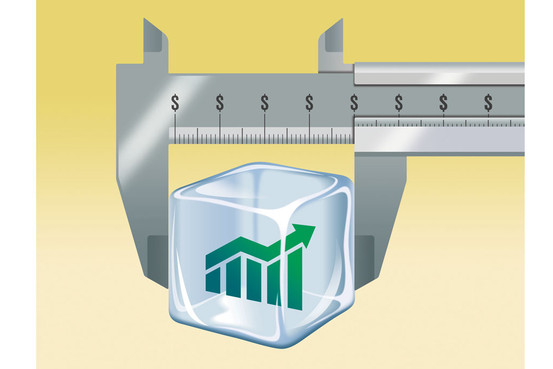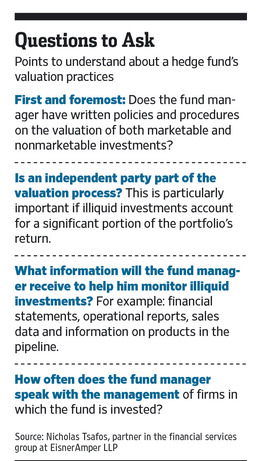|
THE WALL STREET
JOURNAL. |
U.S.
|
Journal Reports
SEC Looking at
How Alternative Funds Value Investments
Regulators say some
unscrupulous managers inflate the value of illiquid holdings
|
|
By
Daisy Maxey
Updated Feb. 3, 2014
4:22 p.m. ET

Lloyd Miller |
Regulators are taking a close look at how hedge funds and other
alternative investment funds value their most illiquid assets. It's
time more investors did the same.
A
fund's valuation method can have a big impact on investors' returns:
It can affect whether an initial investment is made, how much a
manager is paid, and the sale value of a fund's assets. Yet many
investors don't understand how uncertain and subjective pricing can be
for holdings such as complex derivatives or bonds and stocks that lack
active secondary markets.
The
increased focus on valuation issues by regulators is largely the
result of the
Dodd-Frank
financial overhaul. Signed into law in 2010, Dodd-Frank made
hedge-fund managers subject to the same registration and regulatory
oversight as other investment advisers regulated by the Securities and
Exchange Commission. At the start of this year, there were 4,136
investment advisers to private funds registered with the SEC, 2,586 of
which were advising hedge funds.
Coming to Light
SEC
officials "are now in a position to oversee how the funds are doing
these valuations," so more abuses are coming to light, says Jay Dubow,
a partner in the Philadelphia office of law firm Pepper Hamilton LLP.
The
2008 financial crisis put greater focus on the importance of
regulatory scrutiny and due diligence generally. In 2012, the
Financial Accounting Standards Board clarified its existing rules for
measuring assets' fair value and put additional disclosure
requirements in place.
FASB rules now require assets to be
classified in three levels, from Level 1, which are assets such as
listed stock and bonds that are easiest to value, to Level 3, which
are assets for which there isn't observable market pricing.
The
aim with an illiquid asset is to figure out "what would it get in a
sale between a willing buyer and a willing seller," says Stephen
Culhane, a partner at New York law firm Kaye Scholer LLP. Such a
determination can involve significant judgment, and it is "susceptible
to abuse," says Mr. Culhane, who represents private-fund managers and
advises institutional clients on their investments.
SEC Allegations
One
area of focus for the SEC has been the potential overvaluation of
assets when funds are being marketed. Regulators are concerned that
some managers are exaggerating the performance or quality of holdings
by boosting their reported values during a fundraising period, then
writing them down after that period closes.
Because in some cases it's difficult to prove whether a valuation is
accurate or fair, the SEC has tended to pursue allegations that an
adviser isn't adhering to SEC valuation practices, says Jonathan
Green, counsel with Kaye Scholer in New York.
Last
March, for example, Oppenheimer agreed to pay $2.8 million to settle,
without any admission of wrongdoing, allegations by the SEC that two
company units misled investors about the valuation policies and
performance of a private-equity fund one managed. The two business
units involved were Oppenheimer Alternative Investment Management,
which managed the fund, and its parent, Oppenheimer Asset Management.
(Neither has corporate ties to OppenheimerFunds.)
Oppenheimer Asset Management says that it cooperated fully with the
SEC and has put in place additional policies and procedures designed
to ensure that valuations of portfolio positions in its marketing
documents are determined in a manner consistent with its obligations
to investors.
Also
in March, the SEC announced charges that Houston hedge-fund manager
George Jarkesy Jr. and his firm, John Thomas Capital Management, since
renamed Patriot 28 LLC, defrauded investors by inflating valuations on
assets held by two hedge funds. "We vigorously contest the allegations
that were brought by the SEC against Patriot 28 LLC and Mr. Jarkesy,"
says Karen Cook, the firm's attorney in Dallas.
In
October, a judge in U.S. district court in Manhattan refused to
dismiss a valuation-related lawsuit the SEC brought in 2012 against
Yorkville Advisors LLC, a Jersey City, N.J., hedge-fund firm. The SEC
alleged that the firm, its president, Mark Angelo, and its chief
financial officer, Edward Schinik, didn't adhere to the fund manager's
stated valuation policies and ignored negative information about some
investments. Yorkville Advisors didn't return a call seeking comment.
In
reaction to the increased scrutiny, many funds now hire third-party
independent-valuation specialists to ensure compliance when valuing
illiquid assets, and are adding in-house talent, says Michelle Keyes,
a senior manager at accounting firm Rothstein Kass in New York. Ms.
Keyes conducts audits of hedge and private-equity funds for
financial-reporting purposes.
Over
the past five years, increasing numbers of research services have been
used for pricing more-esoteric holdings, says Kenneth Heinz, president
of Hedge Fund Research Inc., a company that tracks industry
performance and is based in Chicago.
Red Flags for Investors
Pension plans and other institutional investors generally hire
consultants when investing in these private funds. Those who don't
should scour funds' financial statements for red flags, says Jason
Scharfman, a managing partner at Corgentum Consulting LLC in Jersey
City, N.J.
In
their offering documents, funds may disclose such items as whether
there are limits on the amount of the portfolio that managers
themselves may price; who is on the valuation committee; whether the
fund administrator has interaction with the committee; and the
administrator's role and valuation approach.
Investors should compare what they read with information they learn
from other documents and conversations with the manager and
administrator, says Mr. Scharfman. "If I know a manager is pricing 10%
of a book himself, I don't want to see that jump up to 40%," he says.
Also
look at the overall level of difficult-to-value assets. "If you are
investing in a global macro fund that's supposed to be in liquid
positions, and you look at its audit and it has a lot of Level 3
assets, that's doesn't make sense," Mr. Scharfman says.
Mr.
Dubow says investors should also check out the fund's auditor. On the
website of the Public Company Accounting Oversight Board, investors
can see which accounting firms are registered with the board and view
registered firms' disciplinary proceedings and inspection reports.
Ms. Maxey is a special
writer for The Wall Street Journal in New York. She can be reached at
daisy.maxey@wsj.com.
|

